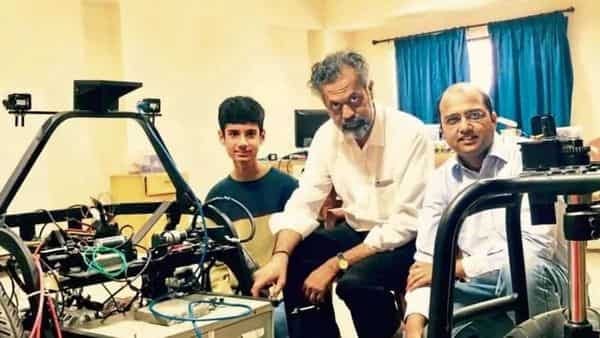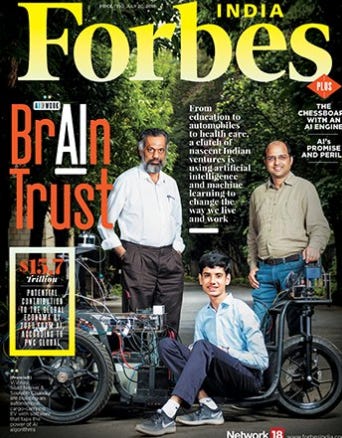The Story of a 14-Year Old CTO
“Genius without education is like silver in the mine.”
-Benjamin Franklin
Hi, this is the GenWise team- we bring out this newsletter to help parents and educators to complement the work of formal schools and associated systems. We can help our children thrive in these complex times only by exchanging ideas and insights and working together.
We are also a founder-member of the Gifted India Network- if you are interested in issues related to gifted education and talent development, an easy way to keep updated about talks, programs and resources is to join the Gifted India Network telegram channel (https://t.me/GiftedIndia). Register for the next upcoming session here (more details in the Upcoming Events section)
In this edition, we share the story of Saad Nasser, an exceptionally gifted student who became the co-founder and CTO of Ati Motors at the age of 14. We were fortunate to have Saad address students in one of our programs in 2019, when he was 17. Saad’s genius would have been like ‘silver in the mine’ (see the Ben Franklin quote above) if not for his parents, a sensitive teacher, a flexible school and committed mentors. This post is composed of extracts from this excellent 2014 article in the Economic Times, written when Saad was just 11. If you don’t have time to read the post, you can read this twitter thread for a summary.


The Story of a 14 Year Old CTO
The Pre-School Years
“It first occurred to Durdana (Saad’s mother) that her son could be gifted when Nasser — all of 20 months — narrated nine rhymes to her, exactly the way she would sing to him every night. “I was surprised,” she recalls. She went on the internet to find out more about this phenomenon. It’s then she realized that her son could indeed be a gifted child. She consulted her sister-inlaw in Canada, whose two children — much older than Nasser — too have exceptional talents. Since then, her sister-in-law has become Durdana’s sounding board.
As the parents slowly discovered their child’s genius, the journey was both exciting and difficult. “He had questions, questions and questions. Like an encyclopedia he would want to know the how and why of everything,” recalls his mother. They would try to answer as best as they could. By the time he was four, they would read him a book and he could read back exactly as they did.”
A Genius is a Misfit in School
“Things changed when Nasser started school. As parents it was their first brush with the challenges of having a prodigy child. School teachers would not understand him, find him absent-minded and often did not know how to handle him. The teachers would request the parents not to teach him ahead of the class. The teachers would reprimand him on small mistakes. This would make Nasser quiet and sad. Everybody was trying to fit him into the system. And he just could not.”
A Sensitive and Committed Teacher
“Then arrived what Durdana calls “a God-send angel”. In 2008, Ranjita Sinha, 39, who had just shifted back from China to Bangalore with her husband, joined Clarence School in Bangalore as the class teacher for class II in which Nasser was studying. “I saw this bunch of boys talking, fighting and playing. Everyone knew each other. But this boy with sparkling eyes seemed the odd one out,” Sinha recalls.
The first time she chatted with Nasser, he spoke about atomic theory. The next day he opted for aerodynamics. “Every day he had a new complicated topic to talk about. Even though I knew little about such things it was evident he hadn’t mugged it up,” she says. She started taking notes and after 15 days attempted to tell the coordinator about this wonder child. But she was brushed aside. At a parent-teacher meeting, Sinha met Nasser’s parents. “They were grappling. Even they weren’t sure about their son’s genius,” she says.
Then began a long journey. Sinha researched on gifted children, persuaded the school to give Nasser flexibility and freedom to study at his pace and started giving Nasser special assignments. It helped. At times, his answers were so difficult and yet original that teachers would find it difficult to mark. Since Nasser was very good with computers she naively reached out to the IT services giants for help. They asked for details but did not revert. Meanwhile, Nasser was finding school dull and boring and did not want to attend any more.”
Genius finds Talented Mentors
“That’s when one of Sinha’s relatives introduced Nasser to Intel. They invited him to their Bangalore office where 15-20 engineers fired complex questions on processors, algorithms and C++ at the class III student. The answers flew back even faster, stunning the engineers.
Convinced of the boy’s genius, Intel stepped in. Today, Nasser has found two great mentors. Once a week he meets Intel’s Gautam Doshi over lunch and learns the secrets of computer science. And every Tuesday, he meets V Vinay, a former IISc professor and cofounder of two start-ups, for lessons on maths. “My means are limited. Finding the right resources to groom Nasser is a challenge. Thankfully we have found great experts like Mr Doshi and Dr Vinay, who are willing to give him time,” says a grateful Pervez. Vinay recalls his first meeting with Nasser with some amusement. “I was sceptical of Saad’s genius when they approached me. Such requests [to meet ‘geniuses’] are not unusual.” Then he met Nasser.
“He was different. The breadth and depth of his knowledge was way beyond his age,” he says. Vinay teaches programming to engineering students and he figured Nasser knew more than them at his age. What he finds particularly amazing is that he has seen geniuses who are great at one or two things. “I have not seen anybody who is so good at so many things,” he says.
Vinay has a lab and Nasser loves to spend time there. Recently, Vinay took a workshop on graphics for third year engineering students. Nasser too joined in. “He knew more than them,” Vinay says.”





